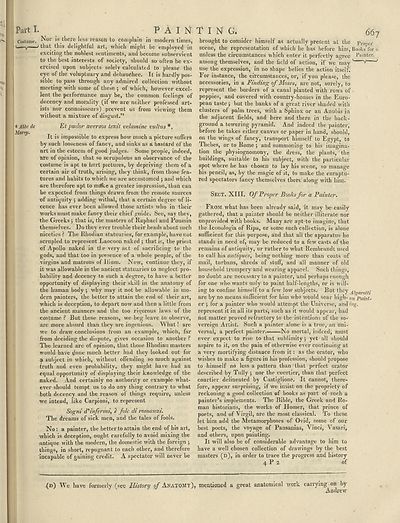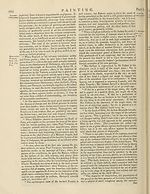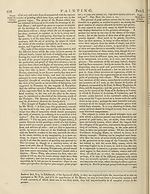Encyclopaedia Britannica > Volume 15, NIC-PAR
(743) Page 667
Download files
Complete book:
Individual page:
Thumbnail gallery: Grid view | List view

Part I. PAIN
Costume. ^Tor is there less reason to complain in modern times,
u—-y—' that this delightful art, which might be employed in
exciting the noblest sentiments, and become subservient
to the best interests of society, should so often be ex¬
ercised upon subjects solely calculated to please the
eye of the voluptuary and debauchee. It is hardly pos¬
sible to pass through any admired collection without
meeting with some of these ; of which, however excel¬
lent the performance may be, the common feelings of
decency and morality (if we are neither professed art¬
ists nor connoisseurs) prevent us from viewing them
without a mixture of disgust.”
* Abbe de Et pudor aversos texit velamine vultus *.
It is impossible to express how much a picture suffers
by such looseness of fancy, and sinks as a bastard of the
art in the esteem of good judges. Some people, indeed,
are of opinion, that so scrupulous an observance of the
costume is apt to hurt pictures, by depriving them of a
certain air of truth, arising, they think, from those fea¬
tures and habits to which we are accustomed j and which
are therefore apt to mJfke a greater impression, than can
he expected from things drawn from the remote sources
of antiquity ; adding withal, that a certain degree of li¬
cence has ever been allowed those artists who in their
works must make fancy their chief guide. See, say thev,
the Greeks ; that is, the masters of Raphael and Poussin
themselves. Do they ever trouble their heads about such
niceties ? The Rhodian statuaries, for example, have not
scrupled to represent Laocoon naked ; that is, the priest
of Apollo naked in tl e very act of sacrificing to the
gods, and that too in presence of a whole people, of the
virgins and matrons of Ilium. Now, continue they, if
it was allowable in the ancient statuaries to neglect pro¬
bability and decency to such a degree, to have a better
opportunity of displaying their skill in the anatomy of
the human body ; why may it not be allowable in mo¬
dern painters, the better to attain the end of their art,
which is deception, to depart now and then a little from
the ancient manners and the too rigorous laws of the
costume ? But these reasons, we beg leave to observe,
are more absurd than they are ingenious. What! are
we to draw conclusions from an example, which, far
from deciding the dispute, gives occasion to another ?
The learned are of opinion, that those Rhodian masters
wrould have done much better had they looked out for
^ subject in which, without offending so much against
truth and even probability, they might have had an
equal opportunity of displaying their knowledge of the
naked. And certainly no authority or example what¬
ever should tempt us to do any thing contrary to what
both decency and the reason of things require, unless
we intend, like Carpioni, to represent
Sogni d'infermi, e foie di romane&i.
The dreams of sick men, and the tales of fools.
No: a painter, the better to attain the end of his art,
which is deception, ought carefully to avoid mixing the
antique with the modern, the domestic with the foreign ;
things, in short, repugnant to each other, and therefore
incapable of gaining credit. A spectator will never he
TING. 667
brought to consider himself as actually present at the proper
scene, the representation of which he has before him, Books for a
unless the circumstances which enter it perfectly agree fainter,
among themselves, and the field of action, if we may lT-—
use the expression, in no shape belies the action itself.
For instance, the circumstances, or, if you please, the
accessories, in a Finding of Moses, are not, surely, to
represent the borders of a canal planted with rows of
poppies, and covered with country-houses in the Euro¬
pean taste} but the banks of a great river shaded with
clusters of palm trees, with a Sphinx or an Anubis in
the adjacent fields, and here and there in the back¬
ground a towering pyramid. And indeed the painter,
before he takes either canvas or paper in hand, should,
on the wings of fancy, transport himself to Egypt, to
Thebes, or to Rome} and summoning to his imagina¬
tion the physiognomony, the dress, the plants, the
buildings, suitable to his subject, with the particular
spot where he has chosen to lay his scene, so manage
his pencil,’ as, by the magic of it, to make the enraptu¬
red spectators fancy themselves there along with him.
Sect. XIII. Of Proper Books for a Painter.
From what has been already said, it may be easily
gathered, that a painter should be neither illiterate nor
unprovided with books. Many are apt to imagine, that
the Iconologia of Ripa, or some such collection, is alone
sufficient for this purpose, and that all the apparatus he
stands in need of, may be reduced to a few casts of the
remains of antiquity, or rather to what Rembrandt used
to call his antiques, being nothing more than coats of
mail, turbans, shreds of stuff, and all manner of old
household trumpery and wearing apparel. Such things,
no doubt are necessary to a painter, and perhaps enough
for one who wants only to paint half-lengths, or is will¬
ing to confine himself to a few low subjects. But they
are by no means sufficient for him who rvould soar high- on Paint.
er } for a painter who would attempt the Universe, and?'«g.
represent it in all its parts, such as it would appear, had
not matter proved refractory to the intentions of the so¬
vereign Artist. Such a painter alone is a true, an uni¬
versal, a perfect painter. No mortal, indeed, must
ever expect to rise to that sublimity} yet all should
aspire to it, on the pain of otherwise ever continuing at
a very mortifying distance from it : as the orator, who
wishes to make a figure in his profession, should propose
to himself no less a pattern than that perfect orator
described by Tully } nor the courtier, than that perfect
courtier delineated by Castiglione. It cannot, there¬
fore, appear surprising, if we insist on the propriety of
reckoning a good collection of hooks as part of such a
painter’s implements. The Bible, the Greek and Ro¬
man historians, the works of Homer, that prince of
poets, and of Virgil, are the most classical. To these
let him add the Metamorphoses of Ovid, some of our
best poets, the voyage of Pausanias, Vinci, Vasari,
and others, upon painting.
It will also be of considerable advantage to him to
have a well chosen collection of drawings by the best
masters (d), in order to trace the progress and history
4 P 2 of
<D) We have formerly (see History of Anatomy), mentioned a great anatomical work carrying on by
Andrew
Costume. ^Tor is there less reason to complain in modern times,
u—-y—' that this delightful art, which might be employed in
exciting the noblest sentiments, and become subservient
to the best interests of society, should so often be ex¬
ercised upon subjects solely calculated to please the
eye of the voluptuary and debauchee. It is hardly pos¬
sible to pass through any admired collection without
meeting with some of these ; of which, however excel¬
lent the performance may be, the common feelings of
decency and morality (if we are neither professed art¬
ists nor connoisseurs) prevent us from viewing them
without a mixture of disgust.”
* Abbe de Et pudor aversos texit velamine vultus *.
It is impossible to express how much a picture suffers
by such looseness of fancy, and sinks as a bastard of the
art in the esteem of good judges. Some people, indeed,
are of opinion, that so scrupulous an observance of the
costume is apt to hurt pictures, by depriving them of a
certain air of truth, arising, they think, from those fea¬
tures and habits to which we are accustomed j and which
are therefore apt to mJfke a greater impression, than can
he expected from things drawn from the remote sources
of antiquity ; adding withal, that a certain degree of li¬
cence has ever been allowed those artists who in their
works must make fancy their chief guide. See, say thev,
the Greeks ; that is, the masters of Raphael and Poussin
themselves. Do they ever trouble their heads about such
niceties ? The Rhodian statuaries, for example, have not
scrupled to represent Laocoon naked ; that is, the priest
of Apollo naked in tl e very act of sacrificing to the
gods, and that too in presence of a whole people, of the
virgins and matrons of Ilium. Now, continue they, if
it was allowable in the ancient statuaries to neglect pro¬
bability and decency to such a degree, to have a better
opportunity of displaying their skill in the anatomy of
the human body ; why may it not be allowable in mo¬
dern painters, the better to attain the end of their art,
which is deception, to depart now and then a little from
the ancient manners and the too rigorous laws of the
costume ? But these reasons, we beg leave to observe,
are more absurd than they are ingenious. What! are
we to draw conclusions from an example, which, far
from deciding the dispute, gives occasion to another ?
The learned are of opinion, that those Rhodian masters
wrould have done much better had they looked out for
^ subject in which, without offending so much against
truth and even probability, they might have had an
equal opportunity of displaying their knowledge of the
naked. And certainly no authority or example what¬
ever should tempt us to do any thing contrary to what
both decency and the reason of things require, unless
we intend, like Carpioni, to represent
Sogni d'infermi, e foie di romane&i.
The dreams of sick men, and the tales of fools.
No: a painter, the better to attain the end of his art,
which is deception, ought carefully to avoid mixing the
antique with the modern, the domestic with the foreign ;
things, in short, repugnant to each other, and therefore
incapable of gaining credit. A spectator will never he
TING. 667
brought to consider himself as actually present at the proper
scene, the representation of which he has before him, Books for a
unless the circumstances which enter it perfectly agree fainter,
among themselves, and the field of action, if we may lT-—
use the expression, in no shape belies the action itself.
For instance, the circumstances, or, if you please, the
accessories, in a Finding of Moses, are not, surely, to
represent the borders of a canal planted with rows of
poppies, and covered with country-houses in the Euro¬
pean taste} but the banks of a great river shaded with
clusters of palm trees, with a Sphinx or an Anubis in
the adjacent fields, and here and there in the back¬
ground a towering pyramid. And indeed the painter,
before he takes either canvas or paper in hand, should,
on the wings of fancy, transport himself to Egypt, to
Thebes, or to Rome} and summoning to his imagina¬
tion the physiognomony, the dress, the plants, the
buildings, suitable to his subject, with the particular
spot where he has chosen to lay his scene, so manage
his pencil,’ as, by the magic of it, to make the enraptu¬
red spectators fancy themselves there along with him.
Sect. XIII. Of Proper Books for a Painter.
From what has been already said, it may be easily
gathered, that a painter should be neither illiterate nor
unprovided with books. Many are apt to imagine, that
the Iconologia of Ripa, or some such collection, is alone
sufficient for this purpose, and that all the apparatus he
stands in need of, may be reduced to a few casts of the
remains of antiquity, or rather to what Rembrandt used
to call his antiques, being nothing more than coats of
mail, turbans, shreds of stuff, and all manner of old
household trumpery and wearing apparel. Such things,
no doubt are necessary to a painter, and perhaps enough
for one who wants only to paint half-lengths, or is will¬
ing to confine himself to a few low subjects. But they
are by no means sufficient for him who rvould soar high- on Paint.
er } for a painter who would attempt the Universe, and?'«g.
represent it in all its parts, such as it would appear, had
not matter proved refractory to the intentions of the so¬
vereign Artist. Such a painter alone is a true, an uni¬
versal, a perfect painter. No mortal, indeed, must
ever expect to rise to that sublimity} yet all should
aspire to it, on the pain of otherwise ever continuing at
a very mortifying distance from it : as the orator, who
wishes to make a figure in his profession, should propose
to himself no less a pattern than that perfect orator
described by Tully } nor the courtier, than that perfect
courtier delineated by Castiglione. It cannot, there¬
fore, appear surprising, if we insist on the propriety of
reckoning a good collection of hooks as part of such a
painter’s implements. The Bible, the Greek and Ro¬
man historians, the works of Homer, that prince of
poets, and of Virgil, are the most classical. To these
let him add the Metamorphoses of Ovid, some of our
best poets, the voyage of Pausanias, Vinci, Vasari,
and others, upon painting.
It will also be of considerable advantage to him to
have a well chosen collection of drawings by the best
masters (d), in order to trace the progress and history
4 P 2 of
<D) We have formerly (see History of Anatomy), mentioned a great anatomical work carrying on by
Andrew
Set display mode to:
![]() Universal Viewer |
Universal Viewer | ![]() Mirador |
Large image | Transcription
Mirador |
Large image | Transcription
Images and transcriptions on this page, including medium image downloads, may be used under the Creative Commons Attribution 4.0 International Licence unless otherwise stated. ![]()
| Encyclopaedia Britannica > Encyclopaedia Britannica > Volume 15, NIC-PAR > (743) Page 667 |
|---|
| Permanent URL | https://digital.nls.uk/192591357 |
|---|
| Attribution and copyright: |
|
|---|
| Shelfmark | EB.11 |
|---|---|
| Description | Ten editions of 'Encyclopaedia Britannica', issued from 1768-1903, in 231 volumes. Originally issued in 100 weekly parts (3 volumes) between 1768 and 1771 by publishers: Colin Macfarquhar and Andrew Bell (Edinburgh); editor: William Smellie: engraver: Andrew Bell. Expanded editions in the 19th century featured more volumes and contributions from leading experts in their fields. Managed and published in Edinburgh up to the 9th edition (25 volumes, from 1875-1889); the 10th edition (1902-1903) re-issued the 9th edition, with 11 supplementary volumes. |
|---|---|
| Additional NLS resources: |
|

